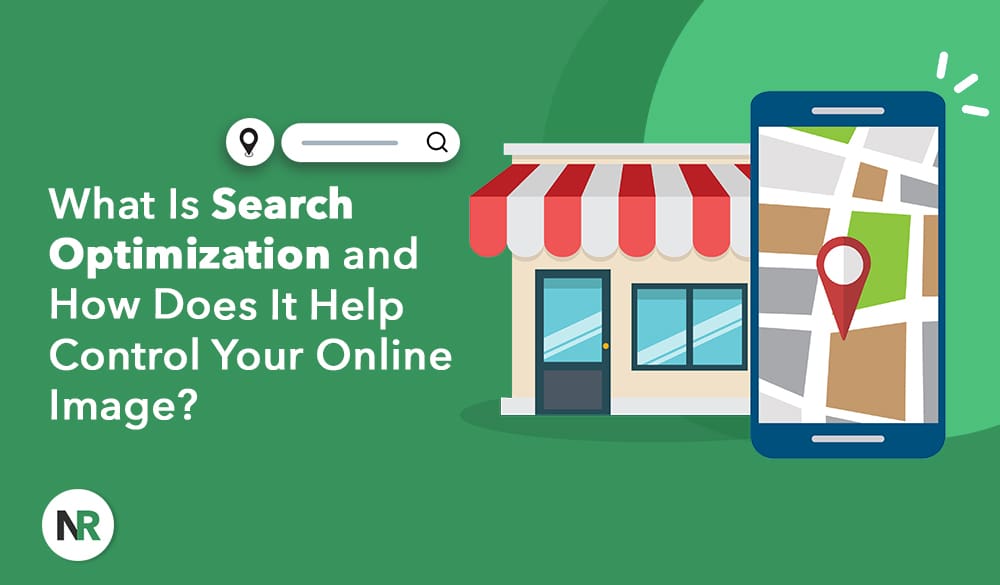This article answers the question, “What is search optimization?” and discusses how SEO and online reputation are related.
When someone searches for your name or brand online, what they find shapes how they feel about you. Even one Google search can lead to — or deter from — you making a sale to a new customer. Similarly, it can give an employer a first impression of you that determines whether or not they hire you.
What can help you avoid giving people the wrong impression so that your personal or professional life doesn’t suffer? Search engine optimization (SEO).
With an SEO strategy, you can improve your personal or professional brand’s online visibility and ensure that the right information appears at the top of search results. By knowing how leading search engines find, rank and show content, you can exercise better control over what people do (and don’t) see — and how they perceive you or your company.
In this article, we’ll answer common FAQs about search engine optimization, including how it works, how it’s connected to digital marketing, and why it’s so effective for managing your digital reputation. Whether you’re optimizing an individual’s presence or a brand’s reputation, knowing how SEO efforts impact search results is a huge step toward building a reputation you can be proud of.
NetReputation provides search engine optimization information and services to help you manage your digital presence. Call us at 844-461-3632 to learn more, or fill out the contact form below for a free consultation.
Request a Free Consultation
What Is Search Engine Optimization?
There are various definitions for search engine optimization:
According to Search Engine Land, SEO “helps search engines understand your website’s content and connect it with users by delivering relevant, valuable results based on their search queries.”
The Dictionary app on Apple devices defines SEO as “the process of maximizing the number of visitors to a particular website by ensuring that the site appears high on the list of results returned by a search engine.”
Google Search Central has a more human-based definition, describing SEO as being about “helping search engines understand your content, and helping users find your site and make a decision about whether they should visit your site through a search engine.”
And Digital.gov, the United States’ official platform for digital government, defines search engine optimization succinctly, calling it “the practice of enabling search engines to index and surface content.”
For our purposes, let’s define SEO as this: The practice of helping search engines understand and index your site’s content so it can be delivered to the right people.
To dive in a bit more, SEO improves a website’s visibility in search results by unearthing relevant and valuable content that matches what users are looking for (which is called “search intent”).
There are three main pillars of SEO:
- On-Page SEO: Optimizing a page’s content and HTML elements, such as headings, internal links, keywords and metadata. This type of SEO makes web pages more relevant and useful to search engines and users.
- Off-Page SEO: External factors that influence a website’s authority, reputation and visibility. These include backlinks, reviews and social media mentions.
- Technical SEO: Elements that determine how well (or if) your site can be crawled and indexed by search engines. Mobile-friendliness, security and site speed are part of technical SEO.
Learn about our search engine optimization services, and call us at 844-461-3632 to speak with an expert.
How Are Search Engine Optimization and Digital Marketing Connected?
Search engine optimization (SEO) is part of digital marketing. And when approached correctly, both SEO and digital marketing channels can amplify one another and drive results.
In many ways, SEO offers a supportive foundation that other digital marketing efforts — such as content marketing, pay-per-click (PPC) advertising, and social media marketing — can build on. For example, an SEO strategy typically includes creating a technically strong website and filling it with keyword-optimized, quality content. That content can then be repurposed for other marketing strategies, such as newsletter marketing, social media campaigns and even paid ads.
When SEO and digital marketing align, the result is a unified online brand presence, which reinforces credibility and trust. Wherever people come across your brand, they’ll see the same level of professionalism and quality that defines you or your company.
Learn more about our business branding solutions.
Google Search vs. Other Search Engines
Google dominates the search engine market. As of the beginning of 2025, Google Search had an over 89% market share. Google’s closest competitor is Bing, followed by Yandex.
This is why Google Search is the main focus of most SEO strategies. However, there are other major search engines that still matter, including:
- Bing: As Google’s main competitor, Bing is worthy of considering, especially when it comes to optimizing for Microsoft users.
- DuckDuckGo: While significantly smaller than Google Search, DuckDuckGo is well-liked for privacy-focused searching.
- YouTube: Some social media platforms, such as YouTube, also function as search engines. YouTube is specifically useful when optimizing video content.
While it’s essential to always optimize for Google Search, it’s also important to ensure your brand is visible on other search engines.
10 Must-Know Elements of SEO
From web search results and rankings to keyword research, paid search and external vs. internal links, here are the elements of SEO that everyone should familiarize themselves with.
What Are Search Engine Results and Search Engine Rankings?
Search engine results are the links and other content you see after you enter a query into Google (or another search engine). These results are included on search engine results pages, or SERPs for short. SERPs display both organic and paid results, along with special features.
The types of search results you may see include:
- Links, images and videos
- Featured snippets
- Related FAQ to your search query
- Local results with a map
- Google’s AI overviews
Search engine rankings are where the results appear on the SERP. If a result is close to the top — for example, if it’s in the first three results on the first SERP — it will gain more clicks than a result that’s low on page one or on page two or beyond.
Not only do you want your content included in search results, but you also want your search results to be ranked highly.
What Is Keyword Research?
The keyword research process involves identifying the words and phrases that your target audience enters into search engines when looking for your brand, products or services (either directly or indirectly). Discovering these search terms also helps you understand what your audience is looking for, allowing you to align your content to meet their needs.
For online reputation management, branded keywords are of particular importance. Your personal name, company name and product names, as well as related words and phrases, make up your branded keywords. When you create content using branded keywords, you can affect what shows up when someone searches for you or your company.
What Is Organic Search vs. Paid Search?
There are two primary types of search results:
- Organic Search: Unpaid search results that appear naturally because they’re optimized well and relevant to the search.
- Paid Search: Sponsored ads that show up at the top of the SERP.
Typically, organic search results are considered more credible because they’ve earned their prominent rankings rather than purchased them.
When it comes to ORM, organic search results are best for building trust with your audience and controlling how you’re perceived online.
What Are External Links vs. Internal Links?
Links connect your content to other web pages, both on your website and beyond. Plus, both internal and external links are important factors when search engines decide how credible your content is.
- Internal Links: These connect pages within your website. First, internal links help guide visitors around your site to find related content. Second, internal linking helps search engines understand your site’s structure.
- External Links: These links come from other sites (preferably authoritative and popular ones) and link back to your content. When you’re able to get high-quality backlinks from leading sites, it signals to web crawlers that your site is also trustworthy.
Our SEO services include relevant link-building. Learn more here.
What Is On-Page SEO vs. Off-Page SEO vs. Technical SEO?
As we mentioned earlier, there are three pillars of SEO. Let’s discuss each one in more depth.
On-Page SEO: This type of SEO optimizes the content and structure of individual web pages, including:
- Headlines
- Internal links
- Keyword placement
- Meta descriptions
- User-friendly formatting
The main purpose of on-page SEO is to ensure that your content communicates its purpose and value to readers as well as search engines.
Off-Page SEO: This type of SEO involves actions that happen off your website while still influencing your organic search ranking, including:
- Backlinks
- Online reviews
- Social media sites
External SEO signals show authority and credibility, which is important for both users and search engines.
Technical SEO: Technical optimization happens behind the scenes of your website and includes:
- Mobile friendliness
- Secure connections
- Site architecture
- Website speed
Having strong technical optimization ensures your site runs smoothly and can be easily interpreted by search engines.
How Does SEO Influence Online Reputation?
SEO is about a lot more than driving organic search traffic to your site. It’s also an excellent tool for shaping and protecting your online reputation. When approached strategically, SEO shows people your best content first, giving you control over the perception of your brand.
First Impressions
Whether it’s a customer, employer, investor, journalist or even neighbor, most people will Google you after meeting you or coming across your name or business in some way.
Over 45% of internet users go online to research brands and products. And when it comes to your personal life, half of all online dating service users search for someone they met online.
What a searcher finds about you online can make or break your reputation in their opinion. SEO allows you to:
- Control the web pages that show up at the top of search results.
- Choose which visuals appear prominently and represent your brand.
- Develop a cohesive narrative that reflects the qualities you want to be known for.
Ultimately, SEO gives you a lot of influence over powerful first impressions.
Brand Credibility and Trust
Search engines reward content that shows consistency, expertise and reliability. Luckily, these are the same qualities that build trust with your target audience. SEO does this in the following ways:
- Ensuring your content is accurate and useful to answer user queries.
- Maintaining consistent branding, messaging and tone everywhere.
- Showing expertise via articles, guides, interviews and other thought leadership content.
- Earning backlinks and mentions from authoritative, credible sources.
Your brand’s reputation will organically strengthen as users and search engines continue to encounter quality, trustworthy content.
Positive vs. Negative Content in Search Engine Rankings
When people search for your name or company online, they’re not likely to go past the first search engine results page (SERP) — or even look beyond the first few results. Consider these stats:
- The top organic Google search result has an average click-through rate (CTR) of 27.6%, and people are 10x more likely to click on it than on the 10th result.
- Over 54% of all clicks go to the top three search results on Google.
- Fewer than 1% of users go beyond the 1st page of Google results.
Here’s why this matters for you: What’s at the top of the first Google SERP is what’s most likely to shape consumer perception of your brand.
SEO can help this by pushing down negative results and prioritizing neutral and positive results at the top of page one. Here’s a bit more about how this is done:
- Neutral and positive content is regularly created and promoted, including blog posts, social media posts and website content. This allows this content to rank higher than negative or misleading results.
- New content is optimized to target branded keywords, like your business name.
- Your content’s authority goes up with the help of backlinks and engagement. This tells search engines which content to put in the top search result slots.
With time, an SEO suppression strategy can make harmful or unimportant web pages more difficult to find.
Ongoing Monitoring and Management
Neither your reputation nor your search results is static. They’ll both change and evolve over time, especially as search engine algorithms change and new content appears. In many ways, your digital reputation depends on an adaptive approach to SEO. This includes:
- Regularly tracking brand-related search engine results to identity emerging problems.
- Updating and optimizing content so that it keeps its high search engine rankings.
- Consistently creating high-quality content that’s fresh and relevant.
- Responding to online mentions and reviews in a way that keeps the conversation positive.
With a proactive SEO strategy, your online presence can grow stronger with time.
Take Control of Your Online Presence with Search Engine Optimization (SEO)
Your SEO plan is more than a technical exercise. It’s also an important tool for shaping how your brand is perceived online.
By understanding and implementing the tools that lead to SEO success, you can ensure that your best content rises to the top of results. At the same time, you’ll increase online visibility and build your digital reputation.
Whether you’re an individual or a brand, your website’s SEO matters. If you’re not able to take on every element of optimization yourself, consider hiring an SEO manager to create, manage and monitor your strategy.
At NetReputation, we work with individuals and businesses to help them build and take control of their online reputation. Give us a call at 844-461-3632 to learn more or fill out the contact form below.






